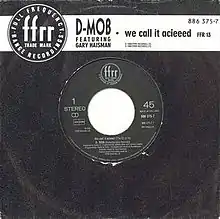| "We Call It Acieed" | ||||
|---|---|---|---|---|
 | ||||
| Single by D Mob featuring Gary Haisman | ||||
| from the album A Little Bit of This, a Little Bit of That | ||||
| Released | 3 October 1988 | |||
| Recorded | 1988 | |||
| Genre | ||||
| Length | 3:17 | |||
| Label | FFRR | |||
| Songwriter(s) | D Mob (as The D) | |||
| Producer(s) | Danny D | |||
| D Mob singles chronology | ||||
| ||||
| Music video | ||||
| "We Call It Acieed" on YouTube | ||||
"We Call It Acieed" is the debut single by British musician D Mob. An acid house-influenced song from the debut album A Little Bit of This, a Little Bit of That, it features vocals by Gary Haisman. The song reached No. 1 on Billboard's Dance Music/Club Play Singles chart and No. 25 on the Hot Dance Music/Maxi-Singles Sales chart in 1989.[2] It also reached number 3 on the UK Singles Chart.[3]
The song is also featured on the compilation albums Dance Massive, Vol. 2 [Phantom], History of Techno [ZYX], Smash Hits 1988 and Acid House Anthems.[4]
Video
The video features D Mob and singing in front of people with yellow masks in the shapes of triangles, squares and circles, with the occasional mask of an eye. The song involves Haisman chanting "Acieed" through the entire video. [5] The yellow smiley face icon had recently been adopted as a symbol of the acid house scene.
The original music video only lasted approximately two minutes long, as the record label FFRR did not think the song would be a hit and chose not to spend further money. Many years later, an unofficial edit of the video was made, stretching the length out to the full 3 minutes and 14 seconds of the radio version by repeating certain parts.
Removal from BBC Playlist
Because the song seemed to be condoning drug use (despite Danny D's claim that the song was about the music and points that out in the lyrics; Poku also notes that he does not smoke, drink, or take drugs), in October 1988,[6] the BBC removed the song from their playlists.[7] The decision to ban the song came especially after Caron Keating and a smiley face T-shirted Steve Wright enthusiastically introduced the video for the song on the 20 October 1988 edition of Top of the Pops during an acid house backlash from tabloids, and this lead for an absence of any records that referenced acid house on the show until "Stakker Humanoid" by Humanoid two months later.[8]
In popular culture
The track was used as a plot device on the BBC soap EastEnders in 2018.[9]
Charts
| Charts (1988–89) | Peak position |
|---|---|
| Australia (ARIA)[10] | 85 |
| Germany (Media Control Charts)[11] | 22 |
| Irish Singles Chart[12] | 16 |
| Netherlands (Single Top 100)[13] | 42 |
| UK Singles Chart[3] | 3 |
| US Billboard Dance/Club Play Chart[14] | 1 |
See also
References
- ↑ "History of Techno [ZYX] - Various Artists - Songs, Reviews, Credits - AllMusic". AllMusic. Retrieved 26 August 2017.
- ↑ D-Mob. "D-Mob - Awards". AllMusic. Retrieved 8 June 2013.
- 1 2 "Official Charts > D-Mob". The Official UK Charts Company. Retrieved 28 May 2016.
- ↑ "We Call It Acieed - D-Mob : Listen, Appearances, Song Review". AllMusic. Retrieved 8 June 2013.
- ↑ "D-Mob "We call it acieed"". YouTube. Archived from the original on 12 December 2021. Retrieved 8 June 2013.
- ↑ Richard Vine (15 June 2011). "We Call It Acieed banned on R1October | Music". The Guardian. London. Retrieved 8 June 2013.
- ↑ Craig Hitchings (25 August 2008). "BBC's banned music to be released". MusicRadar. Retrieved 8 June 2013.
- ↑ Aitken, Stuart (11 November 2013). "Stakker Humanoid: how the Future Sound of London won hearts and minds" – via The Guardian.
- ↑ Lauder, Ed (13 July 2018). "EastEnders: Did Stuart Highway rape Tina Carter in horrifying twist?". Daily Express. Retrieved 9 September 2018.
- ↑ "Chartifacts (from The ARIA Report No. 20)". Imgur.com (original document published by ARIA). Retrieved 28 May 2016.
- ↑ "D-Mob feat. Gary Haisman – We Call It Acieed (single)" (in German). GfK Entertainment. Retrieved 28 May 2016.
- ↑ "The Irish Charts – All there is to know > Search results for 'We Call It Acieed' (from irishcharts.ie)". Imgur.com (original site published by Fireball Media). Retrieved 28 May 2016.
- ↑ "D-Mob feat. Gary Haisman – We Call It Acieed" (in Dutch). Hung Medien. Retrieved 28 May 2016.
- ↑ "Billboard > Artists / D-Mob > Chart History > Dance Club Songs". Billboard. Retrieved 28 May 2016.